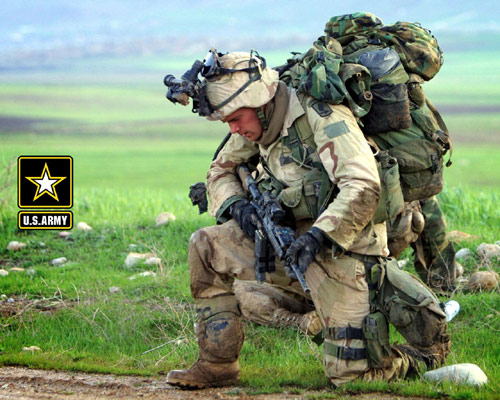
|
During remarks at the Army Aviation Symposium in Arlington, Va., on Jan. 15, Cone quietly dropped a bomb. The Army, he said, is considering the feasibility of shrinking the size of the brigade combat team from about 4,000 soldiers to 3,000 over the coming years, and replacing the lost soldiers with robots and unmanned platforms. “I’ve got clear guidance to think about what if you could robotically perform some of the tasks in terms of maneuverability, in terms of the future of the force,” he said, adding that he also has “clear guidance to rethink” the size of the nine-man infantry squad. He mentioned using unmanned ground vehicles that would follow manned platforms, which would require less armor and protection, thereby reducing the weight of a brigade combat team. Over the past 12 years of war, “in favor of force protection we’ve sacrificed a lot of things,” he said. “I think we’ve also lost a lot in lethality.” And the Army wants that maneuverability, deployability and firepower back. The Army is already on a path to shrink from 540,000 soldiers to about 490,000 by the end of 2015, and will likely slide further to 420,000 by 2019, according to reports. Cone said his staff is putting together an advisory panel to look at those issues, including fielding a smaller brigade. “Don’t you think 3,000 people is probably enough probably to get by” with increased technological capabilities, he asked. It’s hard to see such a radical change to the makeup of the brigage combat team as anything else than a budget move, borne out of the necessity of cutting the personnel costs that eat up almost half of the service’s total budget. Cone used the Navy as an example of what the Army is trying to do. “When you see the success, frankly, that the Navy has had in terms of lowering the numbers of people on ships, are there functions in the brigade that we could automate — robots or manned/unmanned teaming — and lower the number of people that are involved given the fact that people are our major cost,” he said. Some of Cone’s blue-sky thinking was echoed by Lt. Gen. Keith Walker in a Jan. 6 interview with Defense News. In what Walker called the “deep future” — about the 2030 to 2040 time frame — he said that “we’ll need to fundamentally change the nature of the force, and that would require a breakthrough in science and technology.” While Walker, the commander of the Army Capabilities Integration Center, which oversees much of the Army’s modernization and doctrinal changes, didn’t talk about replacing soldiers with robots, he did say the Army wants to revamp its “tooth-to-tail” ratio, or the number of soldiers performing support functions versus those who actually pull triggers. |
“美国陆军正朝着规模更小、作战能力更强、机动性更好、反应更敏捷的方向发展。”美国陆军训练与条令司令部司令罗伯特•科恩上将表示。至于其规模缩减的程度和方式,则令人颇感意外。 综合外国媒体1月21日报道,美国陆军考虑将旅级战斗队的人数削减1/4,从目前的4000人减少至3000人,被裁减的士兵由机器人等无人平台取代。目前,陆军方面已组建一个顾问小组对该计划展开研究。 据美国《防务新闻》周刊报道,美国陆军已开始“瘦身”计划,将在2015年底把陆军人数从54万缩减至49万左右,到2019年时可能最终减少至42万。 科恩说,随着现代科技的发展,3000人规模的作战队已经够用,“我被明确告知,认真考量用机器人来执行部分任务的可操作性,以及这对陆军部队未来的影响”。此外,他还被要求重新思考是否有必要改变陆军现行的9人制步兵班编制。 至于有哪些选项已被纳入讨论范围,科恩列举美国海军利用科技裁减人员的成功经验,称旅级战斗队的运输等部分功能可由机器人完成,“就像执行远途补给任务时,可以将车队中的一部分车辆换成无人驾驶车,它们只需跟着有人驾驶的车前进就能完成任务”。 《防务新闻》指出,目前人力成本几乎占到美军费总额的一半,陆军方面决定对旅级战斗队的人员构成进行“如此激进的改革”,其根本原因只可能是适应军方预算紧缩的现状。 科恩对此表示默认,他举例称使用无人驾驶地面车辆不用考虑人员防护的问题,既能减少车辆的体积,又能节省装甲等防护成本,从而从整体上降低旅级战斗队的费用。 “在过去12年的战争中,为了保护士兵安全,我们牺牲了很多东西,我认为我们也为此损失了不少战斗力。现在,陆军想要重新拿回机动性、可部署性和强大火力。” 不过,对于“用机器人取代士兵”的计划,美国陆军中也存在质疑的声音。基思•沃克是美国陆军能力集成中心负责人,他认为到2030年至2040年,美军的性质将从根本上发生改变,这需要科学技术取得突破性进展,“并且,美军有必要改变前线部队和后勤支持部队的比例,而不是用机器人取代士兵”。 (来源:中国日报网爱新闻iNews) 注:此文为编译。 |
